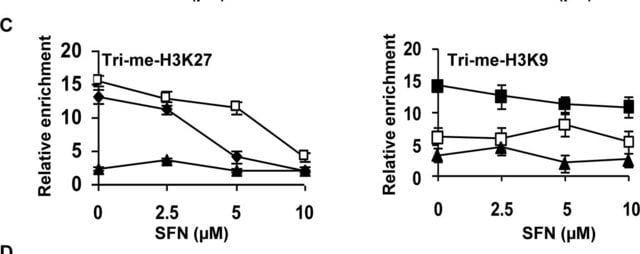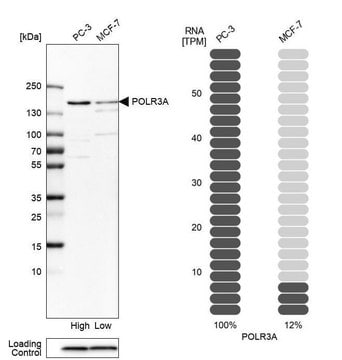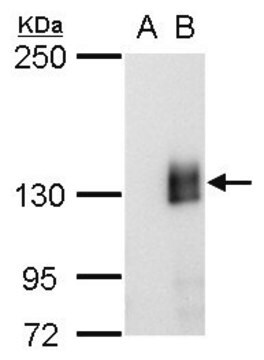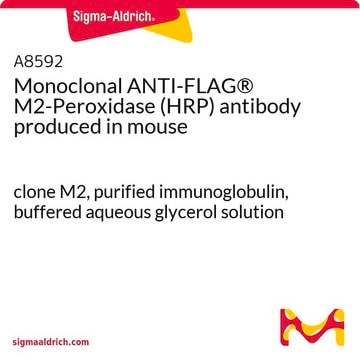SAB2702286
Monoclonal Anti-mCherry antibody produced in mouse
clone GT235, affinity isolated antibody
Sign Into View Organizational & Contract Pricing
All Photos(1)
About This Item
UNSPSC Code:
12352203
NACRES:
NA.41
Recommended Products
biological source
mouse
Quality Level
conjugate
unconjugated
antibody form
affinity isolated antibody
antibody product type
primary antibodies
clone
GT235, monoclonal
form
buffered aqueous solution
concentration
1mg/mL
technique(s)
western blot: 1:500-1:3000
isotype
IgG2b
shipped in
wet ice
storage temp.
−20°C
target post-translational modification
unmodified
Immunogen
Full length mCherry recombinant protein
Application
Suggested starting dilutions are as follows: WB: 1:500-1:3000. Not yet tested in other applications. Optimal working dilutions should be determined experimentally by the end user.
Features and Benefits
Evaluate our antibodies with complete peace of mind. If the antibody does not perform in your application, we will issue a full credit or replacement antibody. Learn more.
Other Notes
Purification: Affinity purified by Protein G
Physical form
Phosphate-buffered saline, no preservative added.
Disclaimer
Unless otherwise stated in our catalog or other company documentation accompanying the product(s), our products are intended for research use only and are not to be used for any other purpose, which includes but is not limited to, unauthorized commercial uses, in vitro diagnostic uses, ex vivo or in vivo therapeutic uses or any type of consumption or application to humans or animals.
Not finding the right product?
Try our Product Selector Tool.
Storage Class
12 - Non Combustible Liquids
wgk_germany
nwg
flash_point_f
Not applicable
flash_point_c
Not applicable
Certificates of Analysis (COA)
Search for Certificates of Analysis (COA) by entering the products Lot/Batch Number. Lot and Batch Numbers can be found on a product’s label following the words ‘Lot’ or ‘Batch’.
Already Own This Product?
Find documentation for the products that you have recently purchased in the Document Library.
Hai-Yan Lin et al.
mSystems, 7(1), e0146321-e0146321 (2022-02-09)
Autophagy is a conserved intracellular degradation mechanism in eukaryotes and is initiated by the protein kinase autophagy-related protein 1 (Atg1). However, except for the autophosphorylation activity of Atg1, the target proteins phosphorylated by Atg1 are largely unknown in filamentous fungi.
Timo Löser et al.
Cells, 10(10) (2021-10-24)
Mitochondria are ubiquitous organelles of eukaryotic organisms with a number of essential functions, including synthesis of iron-sulfur clusters, amino acids, lipids, and adenosine triphosphate (ATP). During aging of the fungal aging model Podospora anserina, the inner mitochondrial membrane (IMM) undergoes
Tu Anh Nguyen et al.
PLoS biology, 16(4), e2004920-e2004920 (2018-04-25)
Horizontal gene transfer (HGT) can promote evolutionary adaptation by transforming a species' relationship to the environment. In most well-understood cases of HGT, acquired and donor functions appear to remain closely related. Thus, the degree to which HGT can lead to
Lea Schürmanns et al.
Cells, 11(3) (2022-02-16)
The maintenance of cellular homeostasis over time is essential to avoid the degeneration of biological systems leading to aging and disease. Several interconnected pathways are active in this kind of quality control. One of them is autophagy, the vacuolar degradation
Our team of scientists has experience in all areas of research including Life Science, Material Science, Chemical Synthesis, Chromatography, Analytical and many others.
Contact Technical Service








